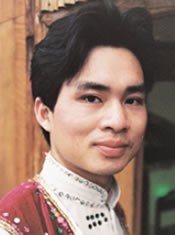Dianbao in China

Photo Source:
Copyrighted © 2026
Operation China, Asia Harvest All rights reserved. Used with permission |
Send Joshua Project a map of this people group.
|
| People Name: | Dianbao |
| Country: | China |
| 10/40 Window: | Yes |
| Population: | 14,000 |
| World Population: | 14,000 |
| Primary Language: | Zhuang, Yang |
| Primary Religion: | Ethnic Religions |
| Christian Adherents: | 0.00 % |
| Evangelicals: | 0.00 % |
| Scripture: | Portions |
| Ministry Resources: | No |
| Jesus Film: | Yes |
| Audio Recordings: | Yes |
| People Cluster: | Zhuang |
| Affinity Bloc: | Southeast Asian Peoples |
| Progress Level: |
|
Introduction / History
The Dianbao language suggests they are descended from the Tai peoples that splintered into dozens of different tribes over the course of history. Today, Tai (or Thai) peoples are scattered throughout Asia from the northeastern part of India to the Tai-speaking minorities in China such as the Zhuang, Dai, Bouyei, and Li. One historian listed more than 25 different Tai tribes in China. The various Zhuang groups - who first appeared in Hunan during the Song Dynasty (960-1279) - migrated to southwest China in the thirteenth and fourteenth centuries, under the pressure of the advancing Mongol armies.
The Dianbao are one of many tribes and language groups combined to form the Zhuang nationality in China. The Dianbao did not oppose being officially classified under the Zhuang minority. As one writer explains, "After the establishment of the People's Republic of China, during the stage of the 'recognition of nationalities,' the Zhuangs from different districts agreed, through democratic consultation, that they be regarded as the Zhuang nationality as a whole."
What Are Their Lives Like?
The Dianbao have a rich collection of folk songs and tales that are handed down from one generation to another.
What Are Their Beliefs?
The majority of Dianbao are animists. They observe a great number of superstitions, especially about eating and how visitors enter their homes.
We don't know of any Christian believers among the Dianbao today. Few have ever heard the gospel. A missionary near the Dianbao region, Mrs. T. P. Worsnip, described her frustrations at the lack of progress she encountered in the early 1920s: "I am sure that when we can speak the language of these people we will be better able to get into their homes. Even though in many cases they can understand Chinese, the fact that they cannot speak it, and we cannot converse with them in their vernacular, causes them to turn us away and to look upon us with contempt. We have felt this very keenly, especially when we have visited the streets where every house is occupied by aboriginal families. They invariably turn us away. There are many villages surrounding Lungchow [Longzhou] where the women speak only [Zhuang], and in order to give them the witness we must know their language or take a woman who can speak for us."
What Are Their Needs?
Without the guidance of Christ, these people will be lost in this life and the life to come. They need someone to go to them as Christ-bearers.
Prayer Points
Pray for the Lord to intervene in their families, calling people to his side.
Pray for loving workers.
Pray for their hearts to be drawn to the Lord of lords.
Pray for a church planting movement to thrive in their communities.